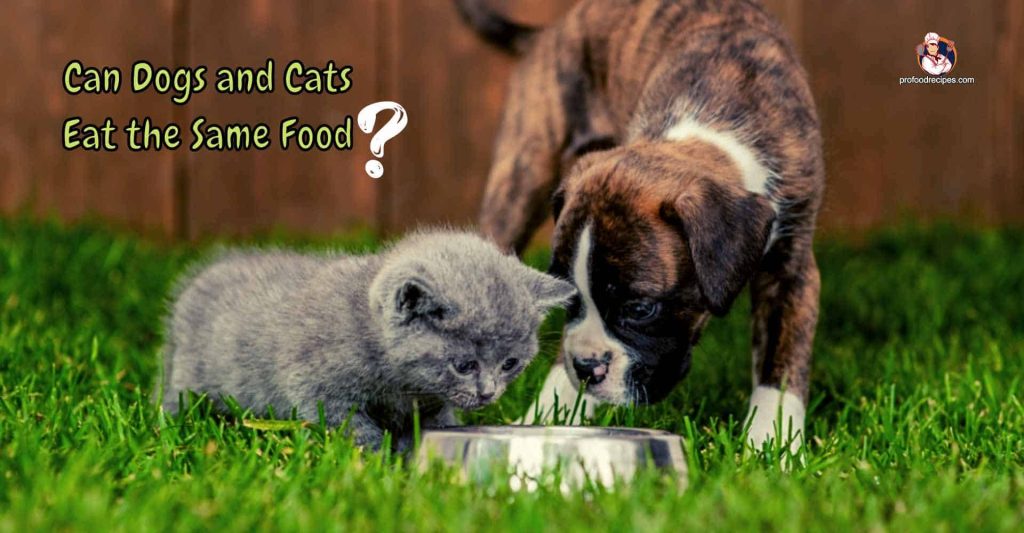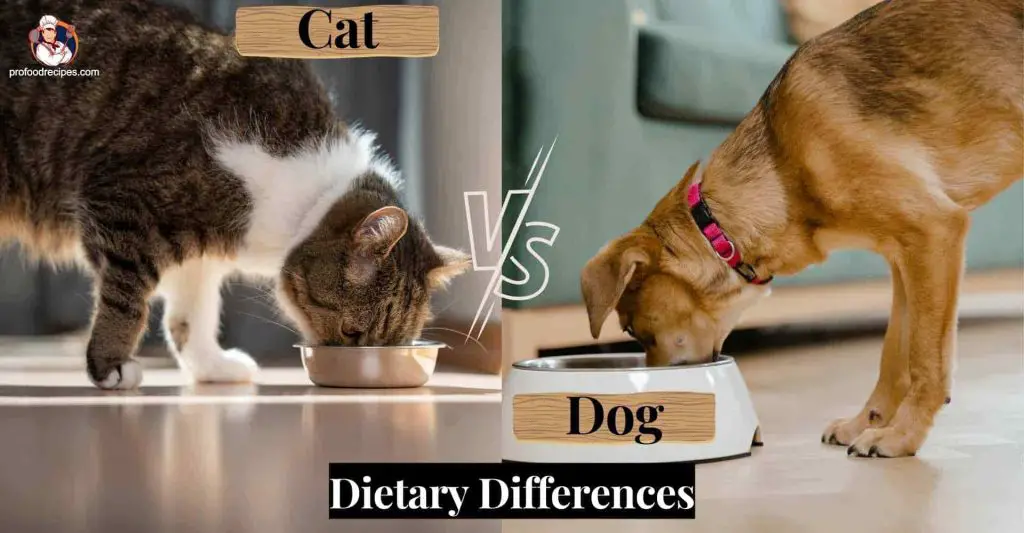Last Updated on February 13, 2023 by Amanda P. Brown
Dogs and cats have distinct nutritional demands, so they can’t eat the same homemade food. The ideal diet for each dog and cat depends on their age, size, and degree of activity. Giving dogs and cats the same homemade meal can deprive them of vital nutrients, which can have fatal or detrimental health effects.
It is only occasionally feasible for dogs and cats to consume the same meals, but feeding them the same prepared food is not recommended daily.
To know more about Can dogs and cats eat the same homemade food? Read on.
Can Dogs and Cats Eat the Same Homemade Food?
Table of Contents

As obligate carnivores, cats need meat- and a fish-based diet low in grains and other carbs. On the other hand, dogs are omnivores and must consume more foods, including those heavy in protein, fat, and carbohydrates. Giving cats and dogs the same food will cause a dietary imbalance. Dog food will also be deficient in several necessary nutrients that cats require.
When a cat is only given dog food, it can suffer from a lack of essential nutrients such as protein, amino acids, fatty acids, and vitamins. Again, because cat diets tend to be more calorie-dense and higher in fat and protein, feeding them to a dog sensitive to fat levels can cause them to gain weight, experience digestive issues, or even develop pancreatitis.
Moreover, ensuring your pet’s diet is well-balanced and meets their dietary requirements while cooking for them at home is crucial. Talk to your vet about making a homemade diet plan for your dogs and cats so you can ensure they get the nutrition they need.
Lastly, homemade food for dogs and cats should be kept separate because of their vastly different nutritional requirements. Besides, small amounts of food for other animals shouldn’t be a problem for canines and felines.
Read More:
Can Cats Eat Dog Food?
No, a cat’s body isn’t designed to thrive on a dog food diet. There can be serious, even fatal, repercussions if a cat is given just dog food for an extended time. This is because various species have distinct nutritional requirements, necessitating the usage of specialized ingredients in dog food and cat food recipes.
Moreover, a short amount of dog food can be fed to a cat, but only in extreme situations or for a limited time. You should always provide your cat with high-quality food designed to meet its unique nutritional requirements when it’s not an emergency.
There is concern that feeding cats a diet high in protein, typically seen in dog food, can harm their health. Therefore, it’s essential to keep enough dog food and cat food available if you have both.
Carnivores like cats only consume meat as their primary food source. Because of their omnivorous nature, dogs require a more diverse diet than meat to satisfy their nutritional needs. Therefore, a cat’s nutritional needs are different from a dog, so feeding your cat dog food isn’t going to help it live a long and healthy life.
Another reason, cats have a higher protein need compared to canines and humans. They have less control of amino acid-metabolizing enzymes in the liver. Enzyme levels in cats are permanently adjusted for a high-protein diet.
Remember that dogs and cats are fundamentally distinct creatures with dissimilar dietary requirements. Short-term benefits from feeding your cat dog food can outweigh the risks, but your cat’s health can suffer in the long run.
Health Risks of Consuming Dog Food for Cats:
- Obesity
- Gastrointestinal Problem
- Diarrhea
- Vomiting
- Hair Loss
- Excessive Grooming
Read More: Can Cats Eat Dragon Fruit?
Can Dogs Eat Cat Food?
Dogs can make by with cat food if they have to, but the nutritional differences usually manifest in tummy troubles, weight gain, and even pancreatitis. For pancreatitis, quick veterinarian care is necessary.
Meat-based protein content in cat food is significantly higher than in dog food. The potent meat aroma and flavor may be why dogs enjoy eating cat food. Despite this, feeding your dog what it craves is not a good idea. Except in rare cases where a veterinarian advises otherwise, feeding your dog cat food is not a good idea.
Similarly, when it’s time for treats, everyone should share. If you have a dog and are curious if it will eat those tasty cat cookies, the answer is yes, but you shouldn’t feed them to your dog very often.
It’s important to remember that even a tiny piece of a cat treat can make your dog crave them in the future. Since cat food typically has a more potent aroma and taste, it might be challenging to wean a cat off the habit.
Health problems can arise if you feed your dog cat food instead of dog food as part of its diet. This is because cat food does not contain the appropriate ratio of protein to fiber nor all of the necessary nutrients for dogs to maintain good health.
Health Risks of Consuming Cat Food for Dogs:
- Pancreatitis
- Sensitive stomach
- Liver Problem
- Obesity
- Liver Problem
- Flatulence
Read More: Can an Adult Dog Eat Puppy Food?
Dog Vs. Cat: Dietary Differences

Here is a comparison table that outlines the differences between the dietary needs of dogs and cats:
| Category | Dogs | Cats |
| Protein | Dogs, being omnivores, require a diet rich in protein. Protein-rich foods for dogs include meat, fish, chicken, and eggs. | Since cats must eat meat to survive, they need a high-protein diet. Chicken, fish, meat, and liver are a few examples of animal-based proteins they need. |
| Fat | Approximately 5-8% of a dog’s daily calorie intake should come from fat, as it is a vital energy source. Chicken fat, fish oil, and flaxseed oil are all high-quality fatty acids that may be fed to a dog. | Fat is essential to a cat’s diet and should account for roughly 8-10% of its daily caloric intake. Chicken fat, fish oil, and canola oil are all good sources of fat for cats. |
| Carbohydrates | Carbohydrates are nutritious for dogs. Rice, potatoes, and barley are all excellent carbohydrate choices for canines. | Carbohydrates are unnecessary for cats’ diets because they do not have a significant energy need. |
| Vitamin and Minerals | Vitamins and minerals like calcium, phosphorus, and vitamin D are essential for a dog’s health, and a healthy diet is necessary. | Some of the vitamins and minerals that cats need to thrive include vitamin A, taurine and thiamine. |
| Water | As with all living things, dogs must have constant access to fresh water. | Cats also need plenty of water and it should make up about 70% of their diet. |
Note: It's important to note that individual dietary needs can vary depending on factors such as age, activity level, and health status. Consult a veterinarian for specific nutritional recommendations for your pet.
Read More:
How to Keep Dogs and Cats Away From Each Other’s Food?

Here are some ideas for preventing cats and dogs from sharing food.
1. Make Use of Bowls of Different Styles
When two bowls look too similar, it might be confusing for a dog or cat to tell them apart. The use of color alone might not be sufficient. Get serving utensils of several sizes, and perhaps try some unique shapes.
2. Discipline
You can teach dogs and cats to only eat from their dish using positive reinforcement. If you notice them eating from another’s bowl, telling them flat-out “no” while still doing it can be effective.
3. Choose a Different Place for Serving Food.
Different feeding stations are good if your dog and cat share a similar eating routine. Consequently, there will be less likelihood of them sharing food from each other’s bowls.
4. Establish Feeding Schedules
No matter how much time you spend at home, it’s important to establish a routine feeding time for both pets. Animals like cats and dogs learn quickly when it’s time to eat because they are creatures of habit. They will be less inclined to try to take the other pet’s food if they are fed at set times and encouraged to eat only then.
FAQs
What Food Can Cats and Dogs Both Eat?
Here are a few examples of foods that can feed both cats and dogs without worry:
· Oatmeal
· Spinach
· Chicken
· Bread
· Bananas
· Turkey
· Salmon
· Yogurt
· Pumpkin
· Carrots
· Apple
· Broccoli
· Green beans
· Peas
· Pumpkin
· Cantaloupe
· Hard Cheese
Why Can’t Dogs Live on Cat Food?
Over time, feeding a dog or cat food is harmful since it does not provide the proper nutritional balance. Protein is an essential component of cat food because it is one of the nutrients that cats require the most. The quantities of carbs, minerals, protein, and vitamins that dogs and cats require are varied.
Can a Cat Get Poisoned by Dog Food?
A cat that accidentally consumes a modest bit of dog food once or twice is unlikely to become ill. However, the Clinical Nutrition Service emphasizes the following qualifications: Healthy cats can eat dog food without any ill effects.
What Happens if a Dog Eats Canned Cat Food?
Some dogs suffer pancreatitis from eating cat food due to its high-fat content (inflammation of the pancreas). As a matter of fact, in some circumstances, this can be fatal for dogs. Please be aware that this is not just a concern with cat food but any high-fat food that a dog can ingest.
How Much Cat Food Can a Dog Eat?
Your dog can have an occasional bite of cat food without any ill effects, but you shouldn’t feed it to them on a routine basis. As a general rule, you shouldn’t give your dog any cat food and should also try to prevent your dog from nosing around in the cat’s dish.
Can Dogs and Cats Eat Rice?
Even though dogs aren’t supposed to eat rice, there are instances in which it can be safely given to them. Feeding your cat rice is as acceptable as doing the same for a dog. A small amount of rice added to your cat’s processed diet may help digestion.
Final Verdict
When cats and dogs share a home, it’s not uncommon for the two species to paw at each other’s food. Hope the above information about “Can dogs and cats eat the same homemade food?” will help you to know the proper answer.
However, before making any significant dietary adjustments to your dog or cat, you should always check with your vet. They can advise you on how to introduce new meals to your pet in a way that is both healthy and appealing to their taste buds and meet their nutritional requirements. Remember that your vet’s guidance is extremely vital if you’re trying to treat a health condition with dietary changes.
You May Also Like to Read:
- Best Vet Approved Homemade Cat Food Recipes
- DIY Homemade Dog Food with Sardines
- Best Homemade Food for Persian Cats
- How Much Should a German Shepherd Eat a Day?
- How to Make Dry Cat Food at Home?

